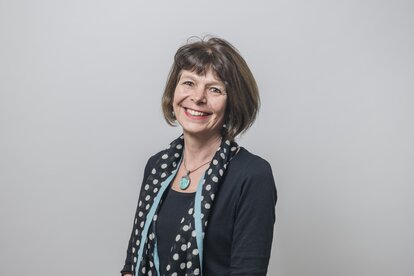With Narjung Shahi
Spring is generally a dry season in Nepal; wind whips up dust along the roads, and water becomes a precious commodity. In Melamchi, the fields around the valley bottom are green with winter wheat, thanks to irrigation – but the terraces on higher slopes are mainly bare. Except, that is, where small irrigation systems exist. Many of these were damaged by the April 2015 earthquake; indeed, in some cases, even the water sources themselves were affected – some dried up, and some reappeared in other places. With funding through Swiss Solidarity, the Helvetas project Recovery of Agricultural Livelihoods (ReAL) has been working since August 2016 to reconstruct irrigation facilities. The project also supports government and private agricultural extension services, works with agricultural input suppliers in building their capacities, and rehabilitates rural water mills (for grinding grain). Social mobilisation is facilitated by the local NGO partner CDECF.

Dawa Sangbo Gurung, Jamyang Tamang, Gyalzen Lama and Pem Bahadur Gurung, pictured here, are members of the Halde Water Users Committee (WUC) – a group receiving water from an irrigation canal that has existed, they say, for at least two generations. The membership currently comprises 24 households, all of indigenous hill ethnicity (Janajatis), and all possessing land in the small settlement of Halde, mid-way up Melamchi valley. Some have only small plots – others more, but none are big landowners; the landholding size ranges from 0.1 to 0.8 ha. It is land that, without irrigation, barely supports a single crop per year; with irrigation, they can grow both paddy in the summer, and wheat or vegetables (mainly for sale) in the winter to spring season. As a result of the earthquake, the irrigation system feeding their fields was completely blocked by a landslide. Once the group members got over the immediate period of rebuilding their homes after the earthquake, renovating their irrigation system became a major preoccupation.
The WUC members first approached the local government – at the time, the Village Development Committee, VDC; under the new federal system, Halde is now part of the Helambu Rural Municipality (which has also endorsed the renovation). Although the scheme was prioritized, there was no money, so the WUC sought support from ReAL/Helvetas. District Programme Coordinator for Helvetas, Narjung Shahi, outlines what happened next.
Technical challenges
The first idea was to tunnel a pipe through the landslide area. However, a survey report showed that this was not feasible – the pipe was difficult to clamp onto the unstable mass of boulders and soil, and even had this been possible, it would have quickly become blocked by debris. We realised that the only possibility was to excavate a new channel, cutting a 5m deep and 60m long portion through the landslide area (as shown in this photo taken at the time). This was actually quite a risk – the cost of bringing in an excavator came to a substantial part of the budget, and we were not fully certain that the excavation would hold. It might simply have collapsed. However, the WUC members were very persistent, so we decided to go ahead.

Community cohesion
What has been particularly important in this renovation activity is the willingness of everyone to work together. We sat together for many meetings with the WUC and our local partner, CDECF, to discuss what to do, and how to do it. Having no alternative means of irrigation, the WUC members were ready to do whatever possible on their part. The photo at the top of this article shows the members working together on the construction.
Dawa Sangbo Gurung, the WUG Secretary, adds as follows: “We didn’t have any knowledge or experience of this type of excavation, so we brought two masons from Barabise who know about such things. They stayed with us for 169 days, and advised us on what to do. Everyone came to help – women as well as men. Although the excavator made things easier, we also had to dig out stones ourselves. In the end this took a lot of time, as we couldn’t work every day. We had other work that we had to manage as well… So whilst we started at the end of Jestha [mid-June], we only finished in early Karthik [late October]. During the latter half of the project we managed to construct part of the canal by ourselves; now the women too can prepare the cement mortar, fix the reinforcement and support construction. Everything we did, we discussed – maybe in total we had 22 or 23 meetings, and for all of them, we kept minutes.”
Water now passes along the cement-lined channel, irrigating the 12 ha of land in which crops of potatoes, tomatoes, cauliflower and wheat are flourishing. Through ReAL, the WUC members are also receiving training and support in agricultural and marketing aspects, such as through Farmer Business Schools, conducted in collaboration with the local Angrima Cooperative.
Canal maintenance
Establishing a mechanism for canal maintenance is an essential part of such renovation work. The WUC has selected two caretakers, who have received appropriate training. A water distribution system has been agreed, and an Operation and Maintenance fund established. For this, the WUC has opened a bank account; through member contributions, it currently has a balance of roughly US$ 310. They have decided to make an annual contribution of a further NRs 4,000 (roughly US$ 38) per ha, divided by household according to landholding size.
As agreed with the (government) National Reconstruction Authority, ReAL/Helvetasis reconstructing 40 irrigation schemes, out of which 25 had been completed by December 2017



